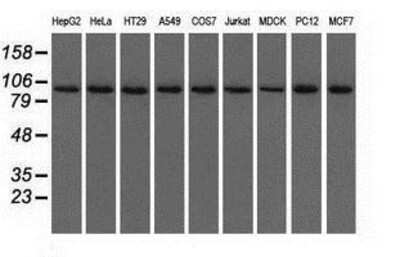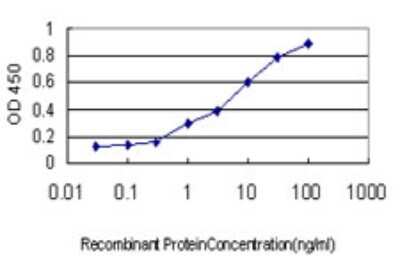Isopeptidase T/USP5 Products
Isopeptidase T/Ubiquitin Specific Peptidase 5 (USP5) is a widely expressed deubiquitinating enzyme belonging to the peptidase C19 family. It is the only known member that requires zinc binding to be active. It has a predicted molecular weight of 95.8 kDa. Human Isopeptidase T/USP5 is 858 amino acids (aa) in length and shares 98% aa sequence identity with the mouse and rat orthologs. Isopeptidase T/USP5 is largely responsible for the disassembly of unanchored poly-Ubiquitin chains. It binds multiple Ubiquitin molecules in a poly-Ubiquitin chain and can cleave Lys29-, Lys48- and Lys63-linked chains. It contains four putative Ubiquitin-binding domains: an N-terminal zinc finger Ubiquitin-binding (ZnF-UBP) domain, a Ubiquitin-specific processing protease (UBP) catalytic domain, and two Ubiquitin-associated domains (UBA1 and UBA2). The ZnF-UBP domain (aa 163-291) selectively interacts with an unmodified C-terminus of poly-Ubiquitin chains and induces a conformational change that prevents Isopeptidase T/USP5 from disassembling poly-Ubiquitin until another deubiquitinating enzyme has released the chain from the ubiquitinated protein. The UBP domain binds the second Ubiquitin in poly-Ubiquitin, while the subsequent Ubiquitins bind the UBA2 (aa 722-762) and UBA1 (aa 654-695) domains. There are short and long forms of human Isopeptidase T/USP5 that differ by an insertion of 23 aa in the long form. Suppression of Isopeptidase T/USP5 has been shown to increase the amount and transcriptional activity of p53 due to the accumulation of unanchored poly-Ubiquitin. Conversely, an up-regulation of USP5 has been associated with fetal Down syndrome.
92 results for "Isopeptidase T/USP5" in Products
92 results for "Isopeptidase T/USP5" in Products
Isopeptidase T/USP5 Products
Isopeptidase T/Ubiquitin Specific Peptidase 5 (USP5) is a widely expressed deubiquitinating enzyme belonging to the peptidase C19 family. It is the only known member that requires zinc binding to be active. It has a predicted molecular weight of 95.8 kDa. Human Isopeptidase T/USP5 is 858 amino acids (aa) in length and shares 98% aa sequence identity with the mouse and rat orthologs. Isopeptidase T/USP5 is largely responsible for the disassembly of unanchored poly-Ubiquitin chains. It binds multiple Ubiquitin molecules in a poly-Ubiquitin chain and can cleave Lys29-, Lys48- and Lys63-linked chains. It contains four putative Ubiquitin-binding domains: an N-terminal zinc finger Ubiquitin-binding (ZnF-UBP) domain, a Ubiquitin-specific processing protease (UBP) catalytic domain, and two Ubiquitin-associated domains (UBA1 and UBA2). The ZnF-UBP domain (aa 163-291) selectively interacts with an unmodified C-terminus of poly-Ubiquitin chains and induces a conformational change that prevents Isopeptidase T/USP5 from disassembling poly-Ubiquitin until another deubiquitinating enzyme has released the chain from the ubiquitinated protein. The UBP domain binds the second Ubiquitin in poly-Ubiquitin, while the subsequent Ubiquitins bind the UBA2 (aa 722-762) and UBA1 (aa 654-695) domains. There are short and long forms of human Isopeptidase T/USP5 that differ by an insertion of 23 aa in the long form. Suppression of Isopeptidase T/USP5 has been shown to increase the amount and transcriptional activity of p53 due to the accumulation of unanchored poly-Ubiquitin. Conversely, an up-regulation of USP5 has been associated with fetal Down syndrome.
| Reactivity: | Human, Mouse, Rat, Canine, Monkey |
| Details: | Mouse IgG2A Monoclonal Clone #OTI2E3 |
| Applications: | IHC, WB |
| Reactivity: | Human, Mouse, Rat |
| Details: | Rabbit IgG Polyclonal |
| Applications: | IHC, WB, ICC/IF |
| Reactivity: | Human, Mouse |
| Details: | Rabbit IgG Polyclonal |
| Applications: | WB, IP |
| Reactivity: | Human, Mouse |
| Details: | Rabbit IgG Polyclonal |
| Applications: | IHC, WB |
| Reactivity: | Human |
| Details: | Rabbit IgG Polyclonal |
| Applications: | IHC, IP, WB (-) |
| Reactivity: | Human, Mouse, Rat |
| Details: | Rabbit IgG Polyclonal |
| Applications: | IHC, WB, ELISA, ICC/IF |
| Reactivity: | Human, Mouse |
| Details: | Rabbit IgG Polyclonal |
| Applications: | WB |
| Reactivity: | Human |
| Details: | Mouse IgG2a Kappa Monoclonal Clone #2C8 |
| Applications: | WB, ELISA |
| Applications: | AC |
| Reactivity: | Human |
| Details: | Mouse IgG2a Kappa Monoclonal Clone #4G4 |
| Applications: | WB, ELISA |
| Applications: | WB |
| Reactivity: | Human |
| Details: | Rabbit IgG Polyclonal |
| Applications: | IHC |
| Reactivity: | Human |
| Details: | Mouse IgG1 Monoclonal Clone #6G1 |
| Applications: | WB, ELISA |
| Reactivity: | Human |
| Details: | Rabbit IgG Polyclonal |
| Applications: | IHC |
| Reactivity: | Human |
| Details: | Rabbit IgG Polyclonal |
| Applications: | IHC |
| Reactivity: | Human |
| Details: | Rabbit IgG Polyclonal |
| Applications: | IHC |
| Reactivity: | Human |
| Details: | Rabbit IgG Polyclonal |
| Applications: | IHC |
| Reactivity: | Human |
| Details: | Rabbit IgG Polyclonal |
| Applications: | IHC, IP, WB (-) |
| Reactivity: | Human |
| Details: | Rabbit IgG Polyclonal |
| Applications: | IHC, IP, WB (-) |
| Reactivity: | Human |
| Details: | Rabbit IgG Polyclonal |
| Applications: | IHC, IP, WB (-) |
| Reactivity: | Human, Mouse, Rat, Canine, Monkey |
| Details: | Mouse IgG2A Monoclonal Clone #OTI2E3 |
| Applications: | IHC, WB |
| Reactivity: | Human, Mouse, Rat, Canine, Monkey |
| Details: | Mouse IgG2A Monoclonal Clone #OTI2E3 |
| Applications: | IHC, WB |
| Reactivity: | Human, Mouse, Rat, Canine, Monkey |
| Details: | Mouse IgG2A Monoclonal Clone #OTI2E3 |
| Applications: | IHC, WB |
| Reactivity: | Human, Mouse, Rat, Canine, Monkey |
| Details: | Mouse IgG2A Monoclonal Clone #OTI2E3 |
| Applications: | IHC, WB |
| Reactivity: | Human, Mouse, Rat, Canine, Monkey |
| Details: | Mouse IgG2A Monoclonal Clone #OTI2E3 |
| Applications: | IHC |


![Western Blot: Isopeptidase T/USP5 Antibody [NBP1-83089] Western Blot: Isopeptidase T/USP5 Antibody [NBP1-83089]](https://resources.bio-techne.com/images/products/Isopeptidase-T-USP5-Antibody-Western-Blot-NBP1-83089-img0003.jpg)
![Western Blot: Isopeptidase T/USP5 Antibody [NB100-77285] Western Blot: Isopeptidase T/USP5 Antibody [NB100-77285]](https://resources.bio-techne.com/images/products/Isopeptidase-T-USP5-Antibody-Western-Blot-NB100-77285-img0003.jpg)
![Western Blot: Isopeptidase T/USP5 Antibody [NBP1-32590] Western Blot: Isopeptidase T/USP5 Antibody [NBP1-32590]](https://resources.bio-techne.com/images/products/Isopeptidase-T-USP5-Antibody-Western-Blot-NBP1-32590-img0007.jpg)
![Immunohistochemistry: Isopeptidase T/USP5 Antibody [NB100-77286] Immunohistochemistry: Isopeptidase T/USP5 Antibody [NB100-77286]](https://resources.bio-techne.com/images/products/Isopeptidase-T-USP5-Antibody-Immunohistochemistry-NB100-77286-img0006.jpg)
![Western Blot: Isopeptidase T/USP5 Antibody [NBP3-38080] - Isopeptidase T/USP5 Antibody](https://resources.bio-techne.com/images/products/nbp3-38080_rabbit-isopeptidase-t-usp5-pab-912202414201343.jpg)
![Western Blot: Isopeptidase T/USP5 Antibody [NBP2-20838] Western Blot: Isopeptidase T/USP5 Antibody [NBP2-20838]](https://resources.bio-techne.com/images/products/USP5-Antibody-Western-Blot-NBP2-20838-img0002.jpg)

![Western Blot: Isopeptidase T/USP5 Antibody (4G4) [H00008078-M02] Western Blot: Isopeptidase T/USP5 Antibody (4G4) [H00008078-M02]](https://resources.bio-techne.com/images/products/Isopeptidase-T-USP5-Antibody-4G4-Western-Blot-H00008078-M02-img0001.jpg)
![Western Blot: Isopeptidase T/USP5 Overexpression Lysate [NBL1-17669] Western Blot: Isopeptidase T/USP5 Overexpression Lysate [NBL1-17669]](https://resources.bio-techne.com/images/products/USP5-Overexpression-Lysate-Adult-Normal-Western-Blot-NBL1-17669-img0002.jpg)
![Immunohistochemistry-Paraffin: Isopeptidase T/USP5 Antibody [NBP2-97889] Immunohistochemistry-Paraffin: Isopeptidase T/USP5 Antibody [NBP2-97889]](https://resources.bio-techne.com/images/products/Isopeptidase-T-USP5-Antibody-Immunohistochemistry-Paraffin-NBP2-97889-img0001.jpg)
![Western Blot: Isopeptidase T/USP5 Antibody (6G1) [NBP3-42952] - Isopeptidase T/USP5 Antibody (6G1)](https://resources.bio-techne.com/images/products/nbp3-42952_mouse-isopeptidase-t-usp5-mab-6g1-10122024172363.jpg)
